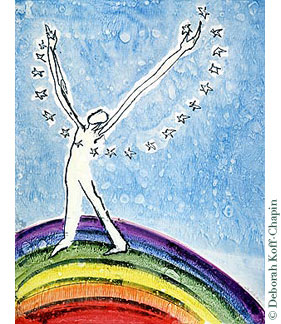I’m one of those people who takes “fun” seriously. When I look at the world’s troubles and what it’s going to take to get through these dark times and actually create a world that works for all, I think I may have stumbled upon a novel solution, or at least a necessary if not sufficient part of the answer.
I’ve coined a phrase to make my point: “If you want to create a new culture, throw a better party!” You’re probably thinking that I can’t possibly believe that we can party our way out of this mess, that I’m in denial at best and probably suffering from delusional escapist fantasies. It’s just a metaphor, but one that I believe contains a powerful truth about human creativity, and may in the end offer us a realistic path to a positive future. Here’s a rough outline of my case:
We live in a time (the 21st century) when humanity has a much clearer picture of what doesn’t work than what does. We know that all life on planet Earth is interdependent, beautiful, and fragile. In terms of creating a just and sustainable future, we know that war and violence will not work, nor social and economic injustice... nor environmental destruction, unchecked global warming, rampant greed and consumerism, military empire, totalitarianism, fascism, fundamentalism, mass extinction, overpopulation, etc.
While the sheer number and complexity of our problems seems overwhelming, it just may be that this painful and scary breakdown of the old world order is a necessary stage in our evolution toward a healthy, viable planetary civilization. My strategy is to “play” to our innate strengths as a creative species, while letting go of our maladapted values, beliefs, and fear-based behaviors. The question is: “What is our essential nature as human beings? Who are we, and what do we have the potential of becoming?”
I don’t want to ignore or deny the dark side of our nature -- evil exists. We’re obviously capable of horrendous, destructive, violent actions, but it’s clear to me that our salvation lies in the higher reaches of human nature. We have huge untapped capacities for love, compassion, kindness, altruism, transcendence, joy, play, and creativity, which, if developed to their maximum, can transform the world as we know it.
I truly find hope in the playful nature of our species. Human play tends to be joyful and fun, and it’s a big part of our lives throughout the life cycle. More importantly, play is at the heart of our creativity -- it opens us to new possibilities, actually making us smarter and better able to adapt to our rapidly changing world. The latest scientific findings show that play, like nutrition and sleep, is a central element in determining an individual’s health, well-being, creativity and intelligence. The National Institute for Play believes that as play is woven into the fabric of social practices, we will dramatically transform our personal health, our relationships, the education we provide our children and the capacity of our society to innovate.
Anthropologists point out that throughout human history most cultures and tribes worked a little and played a lot. The desire for collective joy expressed through dancing, singing, feasting, celebration, festivity, games, and ecstatic religious ritual seems to be at the heart of all human community. Mythic figures like Dionysus, Bacchus, Shiva, Krishna (among many others worldwide) were all fun-loving gods who could bring communities together to share in transcendent experiences, a feeling of being a part of a larger whole. Did I mention that the most enthusiastic participants in these rites were women and nature worshippers?
In “Dancing in the Streets: A History of Collective Joy,” Barbara Ehrenreich shows how the rise of social hierarchy (i.e. patriarchy) goes hand in hand with the rise of militarism and war -- people who wanted to party all the time didn’t make very good soldiers because the evolving weaponry required disciplined armies. Social elites feared that collective festivities could undermine social hierarchies (which they often did). The suppression of traditional festivities reached its zenith with the rise of Calvinism and capitalism. All embodied pleasures were to be suppressed as sinful, and money and material wealth became our most cherished gods. The hedonic vision of community, based on egalitarianism and the joyous immediacy of human experience, gave way to the agonic reality of cruelly unequal and war-loving societies... like our own.
In this context, the revival of the Dionysian in our time -- e.g. the hippie culture of the 60s (sex, drugs, and rock-and-roll), carnival in Brazil, mardi gras in the US, sports spectacles, rave and hip hop youth culture, neopaganism, deep ecology, mass protest movements, etc. -- can be understood as a healthy swing of the pendulum away from the Apollonian warlike aspects of human culture. As Ehrenreich says, “Why not reclaim our distinctly human heritage as creatures who can generate their own ecstatic pleasures out of music, color, feasting, and dance? We are innately social beings, impelled almost instinctively to share our joy, and therefore able to envision, perhaps even create, a more peaceful future.”
Rick Ingrasci M.D., M.P.H.
Another world is not only possible,
she is on her way.
On a quiet day, if you listen carefully,
you can hear her breathing.
she is on her way.
On a quiet day, if you listen carefully,
you can hear her breathing.
- Arundhati Roy -



